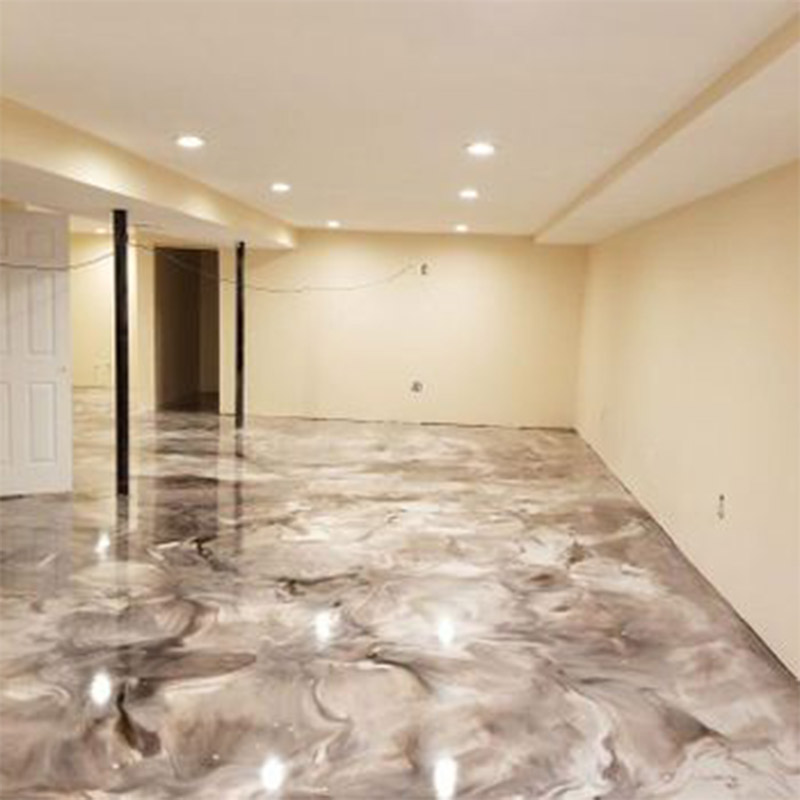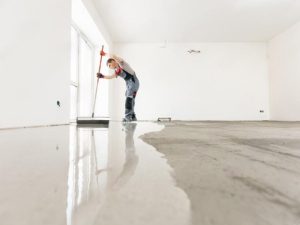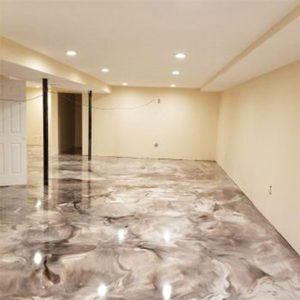Step into a world where ordinary spaces transform into extraordinary sanctuaries, where every corner is infused with a touch of magic and elegance. Welcome to the realm of epoxy flooring—an enchanting journey of transformation that elevates homes to new heights of beauty and style.
In this introduction, we embark on a voyage of discovery—a journey that reveals the transformative power of epoxy flooring in turning houses into havens, and rooms into retreats. Picture yourself stepping across the threshold of your home, greeted not by mundane floors, but by a symphony of colors, textures, and patterns that beckon you to explore further.
Join us as we delve into the heart of epoxy flooring, uncovering its ability to breathe new life into any space, from cozy living rooms to bustling kitchens and serene bedrooms. Together, let us explore the emotional resonance of this remarkable flooring option—the joy it brings, the memories it creates, and the sense of pride it instills in homeowners.
So, dear reader, prepare to be swept away by the beauty and wonder of epoxy flooring as we journey together through the transformative landscape of home design. Let us embark on this adventure, hand in hand, as we discover the endless possibilities of elevating your space with the magic of epoxy flooring.

Definition and composition of epoxy flooring
Epoxy flooring is a durable and versatile flooring solution characterized by its seamless, glossy finish. It is a type of flooring that involves the application of epoxy resin to a prepared substrate, commonly concrete. The resulting surface is not only visually appealing but also highly resistant to wear and tear, chemicals, and other forms of damage. Epoxy flooring has gained popularity in various settings, including residential, commercial, and industrial spaces, due to its aesthetic appeal, durability, and ease of maintenance.
Composition of Epoxy Flooring:
Epoxy flooring consists of two main components that, when combined, create a strong and resilient surface:
Epoxy Resin:
The primary component is epoxy resin, a thermosetting polymer derived from a chemical reaction between epoxide and polyamine hardeners. This resin forms a tough, rigid material that adheres well to the prepared substrate, providing strength and durability to the flooring.
Hardener:
The second component is the hardener, which initiates the curing process when mixed with the epoxy resin. This chemical reaction results in a rigid, plastic-like material that bonds securely to the underlying surface. The hardener also contributes to the epoxy flooring’s resistance to chemicals, heat, and mechanical stress.
Additional Components and Variations:
While the basic composition involves epoxy resin and a hardener, additional components may be incorporated based on specific requirements or desired characteristics. These can include:
Aggregates: Fine or coarse aggregates like sand or quartz may be added to the epoxy mixture to enhance slip resistance and impact resistance. This is particularly common in industrial settings where safety is a priority.
Colorants: Pigments or dyes can be added to the epoxy mixture to achieve a wide range of colors and patterns. This customization allows for creative design options, making epoxy flooring a versatile choice for various aesthetic preferences.
Sealers and Topcoats: To further enhance durability and appearance, epoxy flooring may be sealed with clear epoxy topcoats. These topcoats provide an additional layer of protection, making the flooring even more resistant to abrasion, UV rays, and chemicals.
Solvents: In some formulations, solvents may be used to adjust the viscosity of the epoxy mixture, making it easier to apply and ensuring a smooth, even finish.
Epoxy Flooring vs. Other Flooring Materials
When comparing epoxy flooring with other flooring materials, its advantages become evident. Concrete floors, for example, are strong but porous, which means they can stain, crack, or become dusty over time. Epoxy flooring adds a protective layer that enhances durability and prevents such issues.
Tiles are a popular choice for many households, but they can be prone to cracking and grout lines often trap dirt. In contrast, epoxy flooring creates a seamless surface with no joints, making it easier to clean and maintain.
Vinyl and laminate flooring may be cheaper initially but lack the longevity and durability of epoxy. These materials often need to be replaced every few years, whereas epoxy flooring can last for decades if properly maintained.
Hardwood flooring is aesthetically pleasing but highly sensitive to moisture and scratches. Epoxy, on the other hand, is waterproof, stain-resistant, and far more durable, especially in high-traffic or industrial settings.
Epoxy also stands out due to its customization options. While other materials have limited design possibilities, epoxy offers metallic finishes, 3D effects, decorative flakes, and countless color combinations.
In terms of cost efficiency, epoxy flooring requires a higher initial investment compared to basic flooring options. However, its long lifespan, reduced maintenance, and resilience against damage make it more economical over time.
Ultimately, when durability, maintenance, aesthetics, and cost are considered together, epoxy flooring often outperforms traditional materials in both residential and commercial applications.
Epoxy Flooring for Residential Spaces
Epoxy flooring is no longer limited to industrial or commercial use; it has become increasingly popular in residential settings. Homeowners are choosing epoxy because it combines durability with aesthetic appeal, making it ideal for modern lifestyles.
One of the most common applications in homes is garage flooring. Epoxy can withstand heavy vehicles, oil spills, and tools without damage. It creates a clean, polished look that transforms a typical garage into a stylish and functional space.
In kitchens, epoxy floors are practical due to their seamless design, which prevents dirt and bacteria from collecting in joints. They are also stain-resistant and easy to clean, perfect for busy households.
Living rooms and bedrooms can benefit from decorative epoxy finishes. Metallic and 3D designs create a luxurious, high-end look, while epoxy’s reflective surface makes spaces appear brighter and larger.
Bathrooms are another suitable space for epoxy flooring. Its waterproof and slip-resistant qualities make it safer and more durable than traditional tiles.
Moreover, epoxy flooring is ideal for households with children and pets. It is hypoallergenic, resistant to scratches, and easy to maintain.
By offering style, safety, and durability, epoxy flooring has proven itself to be a practical and modern solution for residential spaces, blending functionality with unique design possibilities.
Epoxy Flooring for Commercial Spaces
Commercial environments require flooring that can handle heavy traffic while maintaining a professional appearance. Epoxy flooring excels in this regard. From retail stores to restaurants, offices, and showrooms, epoxy provides a blend of durability, hygiene, and style.
One major advantage is its low maintenance. Commercial spaces cannot afford frequent disruptions for cleaning or repairs. Epoxy’s seamless, non-porous surface makes cleaning quick and easy, saving time and labor costs.
In restaurants and food service businesses, epoxy floors meet hygiene standards because they resist stains, spills, and bacteria buildup. Their slip-resistant finishes also ensure safety for both staff and customers.
Showrooms and retail stores benefit from the glossy, polished finish of epoxy, which enhances lighting and creates a welcoming atmosphere. Custom colors and designs can even reflect branding, reinforcing a company’s identity.
Healthcare facilities and offices require sanitary flooring that reduces dust and allergens. Epoxy’s hypoallergenic properties and ease of cleaning make it a preferred choice in these spaces.
Finally, epoxy flooring is highly cost-efficient for commercial businesses. Its durability reduces the need for frequent replacements, while its attractive finish creates an environment that appeals to customers and clients.
Overall, epoxy flooring is a long-term investment that supports both functionality and aesthetics in commercial environments.
Epoxy Flooring for Industrial Use
In industrial environments, flooring must withstand extreme conditions such as heavy machinery, chemicals, and constant traffic. Epoxy flooring is specifically designed for these challenges, making it a leading choice in factories, warehouses, and production facilities.
Its resistance to chemicals is one of its most valuable features. Industrial floors are often exposed to oils, solvents, acids, and other harsh substances. Epoxy forms a non-porous barrier that protects the underlying concrete from damage.
Epoxy is also impact-resistant, capable of handling the weight and movement of forklifts, trucks, and equipment without cracking or chipping. Its durability significantly reduces repair and replacement costs in the long term.
Safety is another crucial factor in industrial environments. Epoxy can be customized with slip-resistant finishes and color-coded markings to improve workplace safety and efficiency. For example, certain colors can designate pedestrian walkways, hazardous zones, or storage areas.
The seamless surface of epoxy also makes cleaning easier, ensuring compliance with hygiene and safety regulations. Dust, dirt, and debris are less likely to accumulate, creating a cleaner and safer working environment.
With its unmatched strength, chemical resistance, and safety benefits, epoxy flooring is an essential solution for industries that demand reliable and long-lasting flooring systems.

Different types of epoxy flooring
Epoxy flooring comes in various types, each designed to cater to specific needs and preferences. Here are some common types of epoxy flooring:
Self-Leveling Epoxy Floors:
Ideal for areas where a smooth and seamless finish is crucial, self-leveling epoxy floors are applied to create a flat and level surface. They are commonly used in commercial and industrial settings to provide a polished and durable floor.
Epoxy Mortar Floors:
Known for their exceptional strength and durability, epoxy mortar floors consist of a mixture of epoxy, sand, and hardeners. These floors are highly resistant to chemical exposure, making them suitable for industrial environments where chemical spills are a concern.
Epoxy Flake Floors:
Epoxy flake floors, also known as decorative flake floors, incorporate decorative vinyl flakes into the epoxy coating. This type of flooring is not only visually appealing but also provides a textured surface that enhances slip resistance. It is commonly used in commercial and residential spaces.
Quartz-Filled Epoxy Floors:
Quartz-filled epoxy floors combine epoxy resin with quartz sand. The result is a highly durable and textured surface that offers excellent slip resistance. This type of flooring is often chosen for areas with high foot traffic, such as commercial kitchens and manufacturing facilities.
Epoxy Terrazzo Floors:
Epoxy terrazzo floors blend epoxy resin with a mix of colored aggregates such as marble or glass chips. This type of flooring creates a decorative and highly durable surface, making it a popular choice for commercial and institutional buildings.
Antistatic Epoxy Floors:
Antistatic epoxy floors are designed to dissipate electrostatic charges, making them suitable for environments where electrostatic discharge (ESD) could be damaging, such as in electronics manufacturing or laboratories.
Vapor Barrier Epoxy Floors:
Vapor barrier epoxy floors are specifically formulated to prevent the passage of moisture or water vapor from the substrate to the surface. This type of epoxy flooring is commonly used in areas where moisture resistance is essential, such as basements or areas prone to high humidity.
Solid Epoxy Floors:
Solid epoxy floors are a straightforward, single-color flooring option. While lacking the decorative elements of some other types, solid epoxy floors offer durability, easy maintenance, and a clean, polished appearance. They are commonly used in industrial and commercial settings.
UV-Resistant Epoxy Floors:
UV-resistant epoxy floors are formulated to withstand exposure to ultraviolet (UV) rays without yellowing or degrading. This makes them suitable for outdoor applications or areas with significant exposure to sunlight.
Epoxy Coating for Garage Floors:
Specifically designed for residential garages, epoxy coatings for garage floors provide a durable and visually appealing surface. They offer resistance to chemicals, oils, and abrasion, making them a popular choice for protecting and enhancing garage spaces.
Benefits of Epoxy Flooring
Durability:
One of the primary benefits of epoxy flooring is its exceptional durability. Epoxy creates a tough and resilient surface that can withstand heavy foot traffic, impacts, and various forms of wear and tear. This durability makes it ideal for high-traffic areas and industrial facilities.
Chemical Resistance:
Epoxy flooring is highly resistant to chemicals, including acids, oils, and cleaning agents. This resistance makes it suitable for use in environments where chemical spills or exposure is a concern, such as laboratories, manufacturing plants, and garages.
Easy to Clean and Maintain:
The seamless and non-porous nature of epoxy flooring makes it easy to clean and maintain. It resists stains, and spills can be quickly wiped away, making it an excellent choice for spaces where cleanliness is a priority, such as kitchens, hospitals, and food processing facilities.
Versatility in Design:
Epoxy flooring offers a high level of design versatility. It can be customized with various colors, patterns, and decorative elements. This flexibility allows homeowners and businesses to achieve a unique and aesthetically pleasing look that complements the overall design of a space.
Enhanced Safety Features:
Certain types of epoxy flooring, such as those with anti-slip additives or textured surfaces, can enhance safety by reducing the risk of slips and falls. This makes epoxy flooring a practical choice for areas where safety is a priority, including industrial settings and commercial spaces.
Moisture and Mold Resistance:
Epoxy flooring creates a moisture-resistant barrier, preventing water and moisture from seeping through the floor. This resistance makes it suitable for use in areas prone to damp conditions, such as basements and areas with high humidity. Additionally, its non-porous surface discourages mold and mildew growth.
Long Lifespan:
When properly installed and maintained, epoxy flooring can have a long lifespan. Its resistance to wear and tear means that it can endure for many years, making it a cost-effective flooring solution over the long term.
Quick Installation:
Epoxy flooring can be installed relatively quickly compared to some traditional flooring options. The installation process involves applying the epoxy coating onto the prepared surface, and it typically cures faster than other flooring materials.
Energy Efficiency:
In industrial settings, light-colored epoxy flooring can contribute to energy efficiency by reflecting light. This can reduce the need for additional lighting, leading to energy savings over time.
Environmentally Friendly Options:
Some epoxy flooring formulations are low in volatile organic compounds (VOCs), making them more environmentally friendly. This is particularly important for indoor air quality in residential and commercial spaces.
Maintenance Tips for Epoxy Flooring
While epoxy flooring is low-maintenance, proper care extends its lifespan and keeps it looking new. Regular sweeping and mopping prevent dust and dirt from scratching the glossy surface. A soft-bristle broom or microfiber mop is ideal for everyday cleaning.
Spills should be cleaned immediately to prevent staining or slipping, even though epoxy is resistant to most liquids. For tougher stains, mild soap and warm water are usually sufficient. Avoid harsh chemicals or abrasive cleaning tools that can damage the finish.
In high-traffic areas, consider placing mats or rugs at entry points to reduce wear. Furniture and equipment should have protective pads to prevent scratches.
For industrial or commercial spaces, scheduled deep cleaning with approved cleaners helps maintain hygiene standards. Periodically applying a fresh topcoat can also restore the floor’s shine and protective layer.
By following these maintenance practices, epoxy flooring can last for decades while maintaining its beauty and functionality, making it a reliable choice for all types of environments.
Epoxy Flooring Design and Aesthetics
One of the most appealing aspects of epoxy flooring is its design versatility. Unlike traditional flooring, epoxy offers endless customization options, making it suitable for both practical and decorative purposes.
Metallic epoxy floors are especially popular in modern homes and commercial spaces. They create a 3D, marble-like effect with shimmering pigments that provide depth and uniqueness.
Epoxy flake designs add color and texture while improving slip resistance, making them ideal for garages and recreational spaces. Flakes come in various sizes and colors, allowing for personalized designs.
Quartz-filled epoxy combines strength with beauty, offering a textured finish that is both decorative and functional. These are often used in upscale commercial areas and healthcare facilities.
Color options are virtually limitless, ranging from bold hues to neutral shades. Custom patterns, logos, and even 3D designs can be embedded into the flooring, making it an excellent choice for branding or personal expression.
With epoxy flooring, functionality does not come at the expense of style. Instead, it provides a balance of durability and aesthetic appeal, making it one of the most versatile flooring systems on the market.
Environmental Impact of Epoxy Flooring
As sustainability becomes increasingly important, the environmental impact of flooring materials is a key consideration. Epoxy flooring offers several eco-friendly advantages.
First, epoxy extends the lifespan of concrete floors, reducing the need for frequent replacements and minimizing waste. Its durability ensures that once installed, it can last for decades with minimal maintenance.
Epoxy flooring also contributes to energy efficiency. Its reflective surface improves indoor lighting by enhancing brightness, which can reduce the need for artificial lighting and lower electricity usage.
Many modern epoxy products are low-VOC (volatile organic compounds), making them safer for indoor air quality compared to older formulations. This makes epoxy suitable for sensitive environments like hospitals, schools, and residential areas.
Additionally, epoxy is a protective coating that prevents chemical spills, oils, and pollutants from seeping into the concrete and soil below. This containment feature is especially beneficial in industrial settings where environmental contamination is a concern.
By choosing epoxy flooring, property owners not only gain durability and style but also make a sustainable choice that supports long-term environmental protection.
Cost and Investment Considerations
The cost of epoxy flooring varies depending on the type, design, and installation process. Standard epoxy coatings are generally affordable, while decorative finishes such as metallic or quartz epoxy may come at a higher price.
Factors influencing cost include surface preparation, thickness of the coating, and whether additional features like flakes or textures are included. Professional installation also adds to the cost, but it ensures long-lasting and high-quality results.
Despite the initial investment, epoxy flooring is highly cost-effective over time. Its durability reduces repair and replacement costs, while its low maintenance requirements save money on cleaning supplies and labor.
Epoxy also increases property value by enhancing aesthetics and functionality. Businesses benefit from improved branding and professional appearance, while homeowners enjoy stylish, long-lasting floors.
When considering long-term performance, epoxy flooring proves to be an excellent investment that balances affordability, durability, and aesthetic appeal.

Epoxy Flooring in Different Spaces
Epoxy flooring, with its versatility and array of benefits, finds applications in various spaces, enhancing both functionality and aesthetics. Let’s explore how epoxy flooring is utilized in different settings:
Residential Spaces:
- Garages: Epoxy flooring is a popular choice for garage floors due to its durability and resistance to chemicals and oils. It provides a sleek and polished appearance while protecting the concrete substrate from stains and damage.
- Basements: Epoxy flooring in basements adds a moisture-resistant, easy-to-clean surface. It’s particularly beneficial in preventing water damage and offering a visually appealing alternative to traditional basement flooring.
Commercial Areas:
- Retail Spaces: Epoxy flooring is commonly used in retail environments for its customizable design options. It can be tailored to match branding elements, creating an attractive and durable flooring solution for shops and showrooms.
- Restaurants: The seamless and non-porous nature of epoxy flooring makes it an excellent choice for restaurant kitchens. Its resistance to spills, easy cleaning, and customizable aesthetics contribute to a hygienic and stylish kitchen environment.
Industrial Facilities:
- Warehouses: Epoxy flooring in warehouses provides a durable and impact-resistant surface for heavy machinery and foot traffic. It can be customized with safety features such as anti-slip additives, enhancing workplace safety.
- Manufacturing Plants: Epoxy flooring’s chemical resistance is valuable in manufacturing plants where exposure to various chemicals is common. It creates a seamless and durable surface that can withstand the demands of an industrial setting.
Healthcare Spaces:
- Hospitals: Epoxy flooring is suitable for hospital settings due to its easy maintenance and resistance to chemicals and bacteria. It provides a hygienic flooring solution for areas like operating rooms, laboratories, and hallways.
- Clinics: In outpatient clinics and medical offices, epoxy flooring offers a clean and professional appearance. Its resistance to stains and ease of cleaning contribute to a sterile environment.
Educational Institutions:
- Schools and Universities: Epoxy flooring is used in educational facilities for its durability and low maintenance. It can withstand high foot traffic in hallways and common areas, providing a long-lasting and visually appealing solution.
Commercial Kitchens:
- Restaurants and Cafeterias: Epoxy flooring is an ideal choice for commercial kitchens where hygiene is paramount. Its resistance to stains, ease of cleaning, and customizable design options contribute to a functional and attractive kitchen space.
Automotive Spaces:
- Car Dealerships: Epoxy flooring in car dealerships creates a polished and professional appearance. It withstands the weight of vehicles, resists oil and chemical spills, and contributes to an aesthetically pleasing showroom environment.
- Auto Repair Shops: Epoxy flooring in auto repair shops provides a durable and easy-to-clean surface that can withstand the rigors of heavy equipment and automotive fluids.
Sports and Recreation Areas:
- Gyms and Fitness Centers: Epoxy flooring is popular in gyms and fitness centers due to its durability, shock absorption, and resistance to heavy equipment. It also offers a visually appealing and easy-to-clean surface.
- Indoor Sports Facilities: Epoxy flooring is suitable for indoor sports facilities, providing a resilient surface for activities like basketball, volleyball, and indoor soccer. Its customizable design options can incorporate court markings.
conclusion
In conclusion, the widespread adoption of epoxy flooring across various spaces underscores its versatility, durability, and aesthetic appeal. From residential garages to industrial warehouses, epoxy flooring has proven to be more than just a practical choice—it’s a transformative solution that enhances both functionality and visual appeal.
The most important frequently asked questions about Epoxy Flooring
Where is epoxy flooring commonly used?
Garages, warehouses, factories, hospitals, kitchens, and showrooms.
Is epoxy flooring durable?
Yes, it is highly resistant to wear, impact, and heavy traffic.
Is epoxy flooring slippery?
It can be, but slip-resistant additives can be included.
How is epoxy flooring installed?
By cleaning the concrete surface, applying primer, mixing epoxy resin, and spreading it evenly.





